“Smoke”: New TV Series from Creator Dennis Lehane on Apple TV+

Author and screenwriter Dennis Lehane has penned riveting, emotional tales over the past 30+ years, for page, small, and big screen – Mystic River, Shutter Island, The Wire, Mr. Mercedes, just to name a few.
Often revolving around dark subject matter and themes of loneliness, centering on protagonists who represent society’s most marginalized, his stories are layered and characters complex. In 2022, he created Black Bird, a six-episode series about a prisoner-turned-FBI informant.
Reteaming with the cast and crew of that project, his most recent role of creator and showrunner is on Smoke. Based on the podcast Firebug, the series follows an arson investigator and aspiring author (Dave Gudsen, played by Taron Egerton) and detective Michelle Calderone (Jurnee Smollett) as they track two serial arsonists terrorizing the fictitious town of Umberland. I spoke with Lehane about Smoke, his extensive career and the types of stories he loves to tell.
What worked well in the Black Bird collaboration that made you want to team up again for this new series?
Kary Antholis, one of the producers on Black Bird, was the creator and producer of the podcast “Firebug”. He pitched me while we were still working on that series. I said, “I don’t know, it doesn’t quite sound like me, but let me listen to it.” After listening, I said to him, “There’s something in here that I’m really attracted to. And there’s a bunch of stuff that I’m not. Can we get on the same page here?”
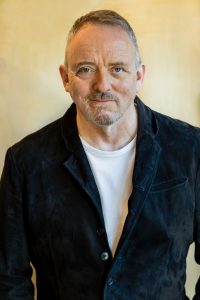
Dennis Lehane. Photo courtesy of BYC Photography
I loved the idea of this performative, toxic male in John Orr. I thought it was so nuts that he thought he was the hero because he was an arson investigator – conveniently ignoring the fact that he was the very arsonist he was chasing – writing a book about an arsonist chasing an arsonist and shopping that book around New York City! I just thought all of that was so insane, so I said that if I could pull some of the details from the real case and really look at what fire is, as an element, as a metaphor for emotional fire, psychological fire, attraction, destruction, all of these things…if I could do that, then I’d do this project. And he said, “Great”.
I immediately pitched Taron, saying that I had this really cool character that I could build a good story around, but I wanted to know if he’d want to do it. He was 100% in, right from the get-go. So before I wrote a line, Taron was my star – I knew it and I was writing to him.
As for the rest of the creative team, I have the same producing partners and I brought in Joe Chappelle as director – I always love to work with him. And I brought back Greg Kinnear because he’s my rabbit’s foot.
How much of what we see onscreen resembles the real-life story of John Orr?
Maybe 10%? At best. There is no Michelle (Smolett), Harvey (Kinnear) or Esposito (John Leguizamo) in real life. Freddy (Ntare Guma Mbaho Mwine) was inspired by a real arsonist, but he never crossed paths with John Orr. They lived on opposite sides of the country from each other, in opposite time periods.
Once I had the “Orr” and that basic personality structure, I just wanted to run with it and go wherever the story could take me. As we, the writers, started to get into it, we realized just how crazy it was. It’s a crazy world we created, and as we started to reflect on our current world, I thought, “Let’s just blow the doors off this thing. Let’s just go nuts, there’s no idea that’s too wild.” The writers knew to at least pitch me, and so we built this story about people who were almost physical representations of chaos. It was a wonderful, super fun writers’ room.
We learn more about Dave and Michelle with each passing episode – tell me about using the nine episodes to develop those two character arcs in particular.
Dave is emblematic of the sort of performative masculinity we see around ourselves, everywhere. Now that there is no clear definition of what masculinity is, we’re left with these actors in our midst playing what it is to be a man. He is somebody who will do anything in his power to never look in the mirror. Ever. Because he will not like what he sees there. He is attracted to fire because it gives him power.
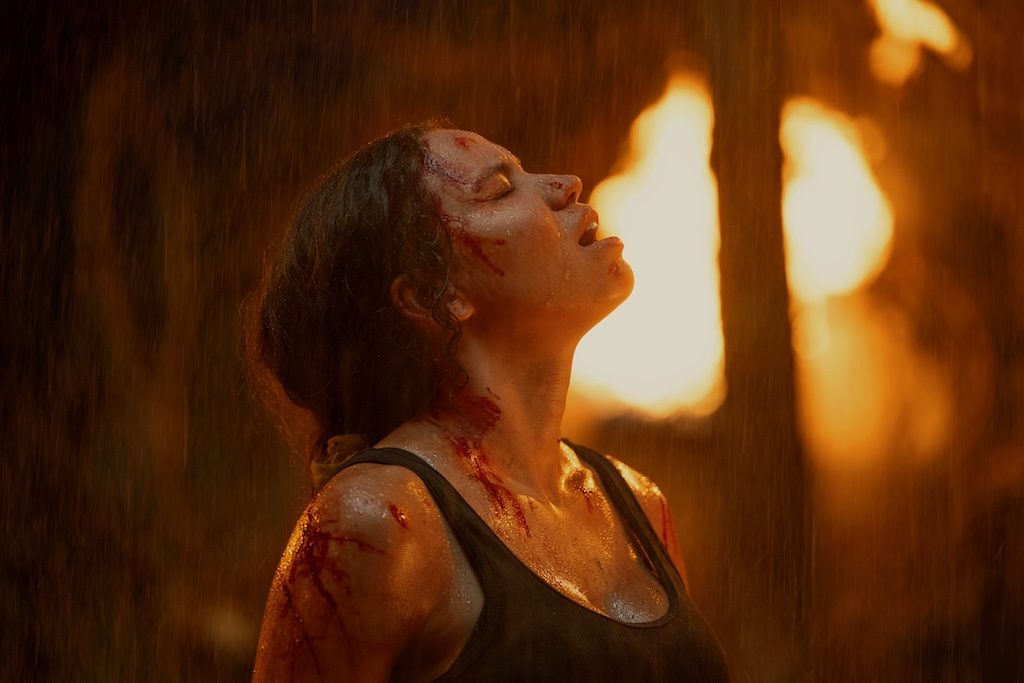
Michelle Calderone (Jurnee Smollett) Photo courtesy of Apple TV+
Michelle is also someone who is in complete denial and running from who she is. Because of past childhood trauma, she is deeply attracted to fire, which, in my opinion, is a stand-in for her own self-destruction. She wants to know how far to the edge of a cliff she can go and come back. And she does that throughout the show. She’s constantly testing the boundaries of what she can get away with – that’s why she became a soldier and then a cop. And that’s why she can’t keep a solid relationship. It’s all of a piece. Dave and Michelle together are like TNT. You know there’s going to be fireworks, and it’s fun. It was fun to look at them as my agents of chaos.
The series tells two parallel stories, that of Dave and that of Freddy. What role does Freddy’s character play in the overall narrative?
Freddy’s like a mirror for Dave, and he’s also my tragedy. Dave portrays himself as a victim. Freddy is a victim. He’s also a very dangerous human being who kills people, and we can never lose sight of that tragedy – which is why I never make the fires he sets look exciting in any way. They’re meant to look as destructive and painful as possible.
But Freddy is spiraling completely out of control, having held it together for as long as he can. I think one of the saddest details about Freddy is when we find out that he has never sent an email to somebody. That’s brutal. Throughout my career, I’ve been very fascinated with loneliness – with the price of it and the people who are absolutely ostracized from society because they’re not smart enough or pretty enough or “whatever it is” enough. I can’t tell you why I have that fascination, but I definitely do.
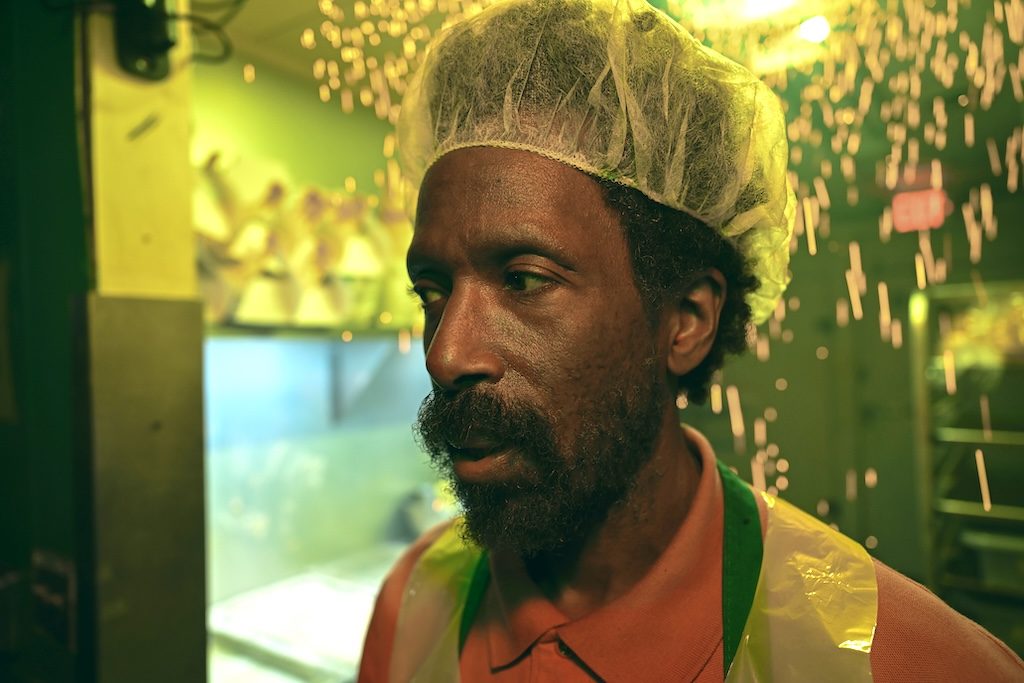
Freddy Fasano (Ntare Guma Mbaho Mwine) Photo courtesy of Apple TV+
Freddy commits so many horrific acts, but for me, he is the character in the show who never had a chance, and I find that heartbreaking. I can hold two diametrically opposed ideas in my hand at the same time. Is he a monster? Yes. But is he a tragic monster? Yes. And Dave is just this privileged white boy who loves his grievance.
There are humorous moments too, many of which come from audio recordings of Dave’s book as he’s writing it. What was it like, as a novelist yourself, to write about an aspiring author? Because it seems like you had some fun with that part of it!
We did! One of the things we did (and we were very conscious of it in the first episode) was we didn’t want to tip our hand. We didn’t want to let anybody really see his writing. Maybe a little bit, but we wanted you, the audience, to go on the dream with him for a little while. Because we all had that dream, all of us in the writers’ room… we were all Daves. It’s the second episode where we let you hear his writing, and then it’s like “Oh dear”.
There’s a deep amount of empathy for that part of Dave. We’ve all been in the room where we’ve showed our work to somebody and gotten the response of, “Oh…it’s good.” We know that doesn’t mean it’s good, and we’ve all written bad lines. So I did have a lot of fun writing Dave’s bad lines – that was one of my most fun jobs, was to write the “Dave Book”.
It goes throughout the show and I really enjoyed those scenes, I was very possessive of them. I’d say, “No, that’s a Dave Book scene, that’s mine.” You can’t do those scenes without some love and some empathy, because poor Dave. He might be a real ass, but there is a tiny part of you that wants to believe he could write that book, take care of his family and everything would be good.
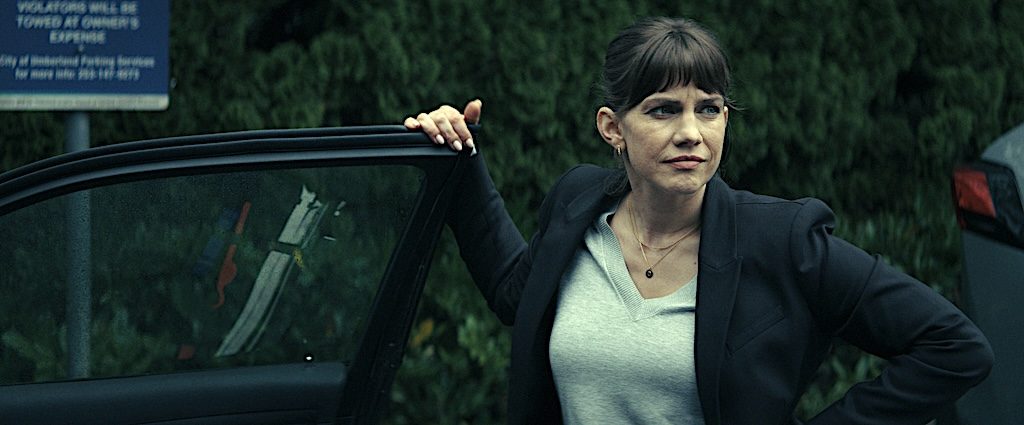
Dawn Hudson (Anna Chlumsky) Photo courtesy of Apple TV+
Tell me about writing realistic characters that have a duality to their nature, especially in a show that very often discusses “heroism”.
I don’t know that I know how to write all good or all bad characters. I just don’t think it’s in my wheelhouse. I don’t know people like that and I’ve never met people like that. Show me a hero and I’m immediately looking for the flaw. Tell me that person is despicable and I immediately want to find out what’s interesting or decent about them. That’s just my nature.
I put a line in one of my books that I thought was very apropos for me – You believe there’s the best and the worst of people and the worst and the best of people. I just think that’s true in human nature. Nobody’s all hero all the time. Nobody’s all villain all the time. So this was just my way of looking at some very messed up people in a very messed up time period. I believe we feel, to some extent, that the world we’re in right now is on fire, and we don’t know if it’s ever going to be put out. And that’s not a political statement – I think people on all sides of the political spectrum believe that this world feels very out of control right now. Every time you turn around, there’s a new feeling of, “Oh my God”. Now we have to deal with AI. Thanks. Wonderful. There’s always something now, and it’s accelerating so fast.
A show is never about the time in which it was set – it’s about the time in which it was written. This show was written in a time where all of our writers are feeling this sense of unease. We’re feeling the sense of total chaos, of, “What’s next?” And I think that’s what the show became.
Why was the decision made to set the story in a fictitious town?
These things are usually dependent on where you’re going to film and we were given some options. We looked at a few different places and I didn’t like any of them. And then we looked at the Pacific Northwest, specifically Vancouver, and I said, “That works for how I see this place.” It was a medium-sized city, and we also thought there would be an amazing visual paradox between green vegetation everywhere and really scary fires. Usually, you see fires and it’s dusty and hot. So that was really the only thing that went into that decision. And then once we decided we’d be shooting in an unnamed place, we thought we’d build our own county. We actually built our own state – if you look closely at the license plates, you can see it’s the 51st state, Orrington.
Over the course of your career, you’ve worked in film and television, authored books, and written both adapted and original screenplays. What stands out to you about the different areas that you’ve worked in and do you have a preferred medium?
All I want to do is tell stories. That’s it. If I tell them as novels, great. If I tell them through screenplays, that’s great. If I tell them as TV shows, great. TV shows are most attractive to me right now because I’ve started to build a niche there. And I love the social aspect of it. After too many years writing on my own, which is not natural to me, I don’t like being alone. So I love being back in a social situation. I love everything about making a TV show.
My least favorite thing about making a TV show is being on set… and I still like it. My favorite part is writing the scripts and then hiring the directors and casting the show… and then shooting it is wonderful. Going through dailies, editing it, the music… oh my God, I love to build my music. I love to build my score and my needle drop, the songs you hear. I feel like a little kid, you know? They’re going to let me do this, and I’m going to keep doing it until somebody figures out that I shouldn’t be, and then they’ll take it away from me. But until that day, I want to just keep doing it.
You’ve also done a lot of teaching. Is there anything that came up frequently from your students in terms of seeking writing advice?
I’ve never taught screenwriting, ironically, but I’ve taught a lot of fiction writing. One of the reasons I left teaching was because nobody was reading anymore, which is really depressing. And that was before social media exploded. People had just stopped reading, and you can’t be a writer and not read. You just can’t. You can maybe be a screenwriter if you’ve watched a million movies and TV shows… but you can’t be a prose stylist if you don’t read prose. So that drove me out of teaching fiction.
With screenplays, the one thing I’ve learned (and it took me 10 years, because it takes 10 years to learn it) is that it is truly a visual medium. I’m somebody who does a lot of dialogue, because I like to have people talk. But the more you do it, the more you realize that that scene where it’s just a camera cut is more powerful than the scene in which the character just told you five things about themselves. So it’s the visual that’s the thing.
[Step 1. Write your script. Step 2. Get Feedback. Don’t set fire to it]
Join the Discussion!
Related Articles
Browse our Videos for Sale
[woocommerce_products_carousel_all_in_one template="compact.css" all_items="88" show_only="id" products="" ordering="random" categories="115" tags="" show_title="false" show_description="false" allow_shortcodes="false" show_price="false" show_category="false" show_tags="false" show_add_to_cart_button="false" show_more_button="false" show_more_items_button="false" show_featured_image="true" image_source="thumbnail" image_height="100" image_width="100" items_to_show_mobiles="3" items_to_show_tablets="6" items_to_show="6" slide_by="1" margin="0" loop="true" stop_on_hover="true" auto_play="true" auto_play_timeout="1200" auto_play_speed="1600" nav="false" nav_speed="800" dots="false" dots_speed="800" lazy_load="false" mouse_drag="true" mouse_wheel="true" touch_drag="true" easing="linear" auto_height="true"]

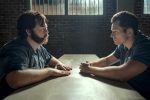





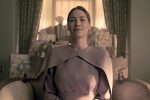
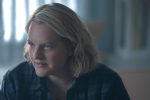
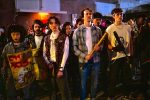
You must be logged in to post a comment Login